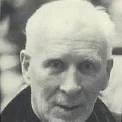Pope Leo XIV – Inaugural Mass Homily
Elected on May 8, 2025, as the 267th successor of St. Peter, Pope Leo XIV’...

Born in France in 1896, Henri de Lubac entered the Jesuit novitiate in 1913 which was at that time located in England due to a French law of 1901 suppressing religious orders. He returned to the continent to serve in the French military during World War I where he sustained an injury which caused him physical problems for the rest of his life. Returning to England after the war to study theology, de Lubac was ordained a priest in 1927and began a career teaching theology at the theological faculty of Lyons. In 1938 he wrote a small book called Catholicism which made a rather big impact. In retrospect, it can be seen as marking the beginning of an important theological movement called ressourcement theology. The theologians who participated in this important trend believed, with de Lubac, that the key to the revitalization of Christian thought and life lay in a critical appropriation of the great sources of Catholic life and thought–the liturgy, the sacred scriptures, the writings of the early Church Fathers, and the writings of other great doctors and mystics, notably St. Thomas Aquinas. This movement came to great visibility immediately after World War II and drew not only applause but serious criticism from certain neo-scholastic theologians who found this “new theology” alarming and even dangerous. Controversy caused the Jesuit superiors to relieve de Lubac of his teaching position in 1950. The absence of teaching duties led de Lubac to put all his energies into writing resulting in four volumes on the history of biblical interpretation entitled “Medieval Exegesis” as well as studies on atheism, Buddhism, ecclesiology, and the sacramental nature of Catholicism. When Pope John XXIII announced the Second Vatican Council in 1959, he appointed de Lubac a member of the Council’s preparatory commission, which lifted from the French Jesuit the cloud of suspicion that had hung over him since 1950. De Lubac later attended the Council as a peritus (1962-5) and had significant impact on several key documents including the Dogmatic Constitution on Divine Revelation and the Pastoral Constitution on the Church in the Modern World. Following Vatican II, de Lubac co-founded the journal Concilium but broke with the journal along with Hans Urs von Balthasar and Joseph Ratzinger when Concilium began to depart from its initial mission of promoting the implementation of the Council and began to assume a posture of dissent. De Lubac joined Ratzinger and von Balthasar as co-founder of a new journal, Communio, which would continue to be inspired by the ressourcement ideal of a critical re-appropriation of the Church’s rich tradition as the only authentic progress. It was not long after the election of Karol Wojtyla as Pope John Paul II (1978) that de Lubac, who came to know the new pope during the four years they were together in Rome for the Council, elevated de Lubac to the College of Cardinals (1983), a very great and rare distinction for a priest theologian. Already well into his eighties, de Lubac lived only a few more years after receiving this great honor (he died in 1991). But this recognition was granted more for our sake than for his–it tells us that in the judgment of the Pope that many now call John Paul the Great, de Lubac’s thought is a model of what Catholic theology should be–traditional, progressive, and life-giving, all at the same time. Biography by Dr. Italy